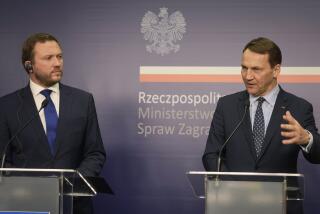Gore Assures Baltic States of U.S. Support
- Share via
TALLINN, Estonia — In a whirlwind visit Monday to this Baltic coast capital, Vice President Al Gore sought to allay fears among Estonians, Latvians and Lithuanians that they are being left out in the cold in their appeals to join NATO.
In a speech on the central cobblestone square in Tallinn’s medieval Old Town, Gore insisted that the United States will not turn its back on the fledgling Baltic countries that have long been overrun by foreign invaders.
“You must not be consigned to a gray zone of fear and uncertainty,” he told a crowd of 7,000, many of them waving American flags. “We will never condone any state in Europe threatening the sovereignty of its neighbors again.”
Security concerns, vis-a-vis Russia, dominated Gore’s meetings with the three Baltic prime ministers, as the people of this newly independent region find themselves caught between former occupiers in Russia and East European countries also seeking to forge new links with the West.
The Baltic states have emerged as the economic tigers of the former Soviet Union. But that relative success has only enhanced feelings of vulnerability when Russian nationalists such as Vladimir V. Zhirinovsky are expressing the desire to reabsorb this region into an expanded Russian Federation.
Estonia, Latvia and Lithuania are the only former Soviet republics that have declined to join the Russian-dominated Commonwealth of Independent States; their relations with Moscow have been cool at best.
The Baltic nations’ hunger for protection within the North Atlantic Treaty Organization, Moscow’s Cold War-era enemy, has raised hackles in the Kremlin and set relations between the former rivals on edge.
Gore insisted that “no outside power should ever again cast a veto over your future,” but he also reiterated Washington’s position that Russian sensitivity about including former Soviet republics must be taken into account.
“It is important to understand that the process by which NATO expands is a process that must take place at the same time the relationship between NATO and Russia is deepened and clarified,” he said after meeting with Estonian President Lennart Meri.
That veiled message to “wait until Russia approves it” is just what has Baltic populations nervous as they watch their erstwhile occupiers charting an increasingly adversarial relationship with the West.
Russia has refused to heed American objections to a $1-billion deal to build nuclear facilities in Iran, and its brutal war against the breakaway southern republic of Chechnya is also straining relations.
More to Read
Sign up for Essential California
The most important California stories and recommendations in your inbox every morning.
You may occasionally receive promotional content from the Los Angeles Times.













